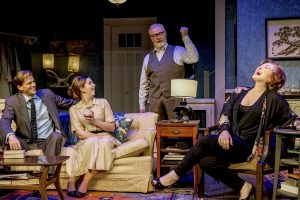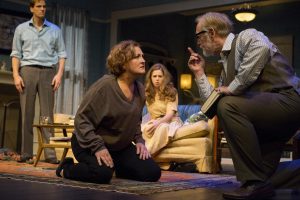Intrepid’s ‘Woolf’ Approaches Brilliance
Edward Albee’s Who’s Afraid of Virginia Woolf is arguably the greatest English language play of the 20th Century. I realize that I might have quite a bit of dispute in store by making such a claim, but it’s certainly my favorite. I love the depth it plows in pulling apart the glue that binds people together and the surprises it has in store for those who think that relationships are knowable.
All of which is to say that the Intrepid Theatre Company production of Who’s Afraid of Virginia Woolf? that is currently running at downtown’s Horton Grand Theatre documents expertly the pulling apart but also provides plenty of room for discovering the surprises.
The plot is by now nearly iconic: George (Robert Smyth) and Martha (Deborah Gilmour Smyth) come home from a party at the home of the president of the small liberal arts college. Martha, the president’s daughter, reminds her history professor spouse that she’s invited a new young faculty couple over for late-night drinks. Nick (Ross Hellwig) and Honey (Erin Petersen) arrive to find Martha swilling her gin and George palpably upset over his wife’s late night invitation. Alcohol flows freely, and everyone (except, perhaps, George) says or does things that they will regret in the morning.
On the surface, Virginia Woolf is about academic politics and how they are particularly vicious because “the stakes are so low.” Or, it’s about the games that couples play, power games mostly. But, these explanations don’t account for how shattering the story becomes as it progresses.
[quote]everyone (except, perhaps, George) says or does things that they will regret in the morning…[/quote]
And, that’s because it’s really about these couples’ relationships and how they manage those relationships. Here, George and Martha, who have been stuck together for a lot of years, have well-developed stories that help them to cope (Joan Didion’s well-known aphorism, “We tell ourselves stories in order to live,” comes to mind). Like all relationships, there is some parts of their stories that are true, and other parts that aren’t. There are some parts where the members of the couple agree and other parts where one person has a story that the other neither agrees with it nor likes it when it’s shared with others.
This dynamic plays out in both couples, and director Christy Yael-Cox has cagily cast couples who are exceptionally well-matched. I have seen productions where it appears that Nick and Honey’s relationship basks in the glow of youth while George and Martha’s relationship is dysfunctional, only to discover by play’s end that things are quite the opposite. Not so in this production. If anything, it plays as though George has made a deliberate decision to disrupt the stories that Martha and he have jointly constructed for the purpose of forcing Martha out of her rebellious behavior and bring the two of them back together, on different terms. George’s actions have a similar effect on Nick and Honey, though he may not have planned it that way.
But, he may have planned it, at least in Mr. Smyth’s version of George. While the other three characters swing wildly out of control and one point or another, George always seems to be on track (even his angry outbursts seem calculated). I don’t think I’m accusing Mr. Smyth of giving a calculated performance. Rather, in Mr. Smyth’s hands, George gives a calculated performance.
As I noted, though, the others are well-matched, so Mr. Smyth’s performance emerges from the pack only in retrospect. Credit Ms. Yael-Cox’s direction and the cast’s deep understanding of the play for shaping the dynamic in a very interesting manner.
The production is deceptively simple. Mike Buckley’s scenic design is full of clues about who George and Martha are, both as individuals and as a couple. Jeanne Reith’s costumes, particularly for Ms. Gilmour Smyth, telegraph the character’s intentions (though, sometimes those intentions are not fulfilled). Curtis Mueller’s lighting relies heavily on the fixtures on stage, to good effect. Kevin Anthenill’s sound design is small-scale compared to Ragtime, his other currently-running show, but his original music strikes just the right tone.
It is always wonderful to see a classic this well done. Calling something brilliant is typically overkill, but this production comes darn close.
[box]Performs at the Horton Grand Theatre, 444 Fourth Ave (between Island & J St.) in downtown San Diego. Parking can be very difficult. There are some hints about finding parking on the Lamb’s Players Theatre website (this production performs in a theatre operated by Lamb’s Players Theatre – Intrepid has a “residency” here, but Lamb’s is selling the tickets to the show – nevertheless, you can go to Intrepid’s website and find a link to online ticket sales). If you’d prefer to call, the Lamb’s box office number is (619) 437-6000. The play is in three acts, and opening night’s performance (February 13) ran around three totally engaging hours. The production plays Thursdays through Sundays and closes March 13.




